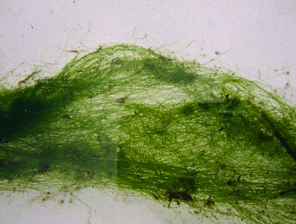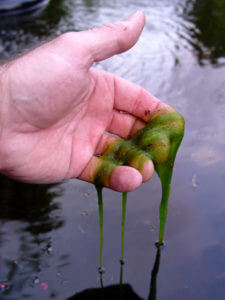Spring has arrived with temperatures slowly warming and nature becoming more energised. To top that you are the proud owner of a garden pond built with high quality pond liner, sited in the perfect location allowing just enough daily sunshine to keep your indigenous aquatic plants thriving and your fish healthy and happy. But, on closer inspection you notice all is not entirely perfect – Spring has bought with it the proliferation of string algae, or Blanket weed as it is known in the UK. Is this going to affect the health of your fish and aquatic plants? No, but it may cause damage to your pond pump and filter. It is also about the aesthetics of your pond which suffers when this filamentous plant species grows. So what has caused this algae to grow in your pond?
String algae thrives in ornamental ponds and is often found hanging off the side of rocks or covering the water surface. It grows very quickly in both length and weight so treating it early is highly recommended.
The growth of String algae is increased by bright sunlight and shallow fast running water. In ornamental garden ponds which tend be stocked with fish, there is a tendency to overfeed them. This causes additional fish excrement which contains nutrients particularly nitrates and dissolved ammonia. These nutrients speed up the growth even faster than by photosynthesis alone. String algae also thrives in garden ponds located in sunny positions with very little planting to provide shade across the surface.
First identify the possible cause of String algae
 Too many nutrients in the water commonly as a result of over feeding fish, which then excrete ammonia and other harmful chemicals into the water. The over-fed fish will also have no further appetite to eat small particles in the water. The un-eaten food and fish excrement will lead to a build up of organic matter (sludge) on the bottom.
Too many nutrients in the water commonly as a result of over feeding fish, which then excrete ammonia and other harmful chemicals into the water. The over-fed fish will also have no further appetite to eat small particles in the water. The un-eaten food and fish excrement will lead to a build up of organic matter (sludge) on the bottom.- Leaching of fertilisers into the pond water or rainwater run-off carrying with it fertiliser or plant feed.
- Common pond debris such as fish faeces and fallen leaves add to the nutrient level in the water.
Algae can be promoted by using tap water to fill or top-up ponds so ideally use rainwater collected in a butt. The cause of this is unclear, but might be related to the chlorine content affecting the natural balance of the pond.
Prevent growth of String algae
 Remove fallen leaves from your pond during Autumn months before sink to bottom and start decomposing.
Remove fallen leaves from your pond during Autumn months before sink to bottom and start decomposing.- Limit the amount of sunlight encouraging algae to photosynthesis and grow. A temporary measure would be to put up a pergola to cast shade over pond limiting amount of sun onto pond until algae problem is resolved.
- Avoid adding tap water which contains chlorine.
- Feed fish the exact amount of food
- Keep pond water well aerated so water moves constantly.
- Add extra aquatic plants.
String algae or Blanket weed are easily removed by twirling them out of the pond with a cane. The algae can be discouraged by floating a mesh bag of barley straw on the pond. Add the straw in spring and remove it when it has turned black (usually about six months later).
Various other products are available that combine barley straw extract with a blend of micro-organisms designed to remove nutrients from the water and discourage algal growth. Do not be tempted to change the water in the pond, as it will bring only short-term relief.
The natural balance of a pond does include some algae so this is not about getting rid of all traces of algae totally but rather all that is affecting appearance and water quality.
Additional Articles:






Astonishingly user friendly website. Enormous info offered on few gos to
Frank Lampard http://secretsexboutique.com/index.php/component/k2/itemlist/user/112579
Many thanks extremely beneficial. Will certainly share site with my pals
Pavel Nedved http://www.hk-storage.com/forum/home.php?mod=space&uid=511135&do=profile&from=space
Many thanks extremely beneficial. Will certainly share site with my pals
David Villa http://www.pet100.cn/home.php?mod=space&uid=635480&do=profile